
Dandenong Veterinary Hospital is proud to offer our clients a large array of medical and surgical care, and a broad range of diagnostic services. We are a purpose-built building with a large proportion of our hospital dedicated to hospital and surgical patients. Anaesthesia and Surgery are performed on weekdays, while appointments are conducted seven days a week. Unwell animals may need to stay with us for Hospitalisation, and we have a dedicated Intensive Care section of the hospital to cater for those who are unwell.
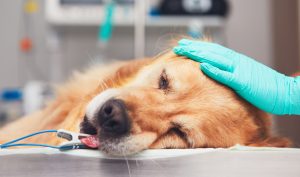
Surgical and Dental Procedures
----> Why Choose Dandenong Veterinary Hospital to take care of your pet's surgical procedure?
We perform a large number of surgeries, with surgical procedures conducted 5 days per week. We have a purpose built surgery room, which is used for all our sterile surgeries, and a separate area for dental and contaminated surgeries. Surgeries performed can be broadly grouped into the categories of soft tissue, orthopaedics, dental cleaning, dental extractions, and desexings. Detailed estimates are provided for all surgeries, and extensive pre and post surgery instructions are provided to owners. Most surgeries are day procedures. All of our surgeries receive excellent pain relief, intravenous fluids, low risk anaesthesic agents, extensive monitoring by a dedicated theatre nurse and much more as detailed below. Cats are tested for FIV to ensure there is no inadvertent spread of this significant infectious disease to other surgical patients. We require routine (non-emergency) patients are up to date with vaccinations, have had a health check within the previous 3 months and have had a detailed discussion with us about the surgery, risks and pre-anaesthetic blood testing options. These discussions take place prior to the surgery day, to make admission on the day of surgery smooth. All surgical procedures require pre-payment, or pre-approval with a credit facility such as VetPay.
Specialist procedures are referred where appropriate, or Specialist Surgeons can visit our hospital to perform the procedure here with us.
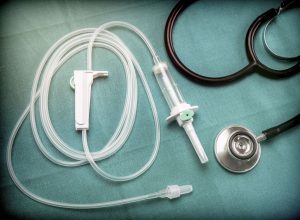
General Anaesthesia, and lowering of General Anaesthetic risk
----> Why Choose Dandenong Veterinary Hospital to take care of your pet's surgical procedure?
We are particularly proud of the anaesthetic regime performed here at Dandenong Veterinary Hospital. All anaesthesia comes with some (albeit very low) risks, so we take multiple measures to ensure this risk is as low as possible for all our patients. Pets are much loved family members, and we know how daunting it can be when they come in for a General Anaesthetic.
Pre-anaesthetic blood testing is offered to all patients before the surgery day to screen for unknown internal organ issues, even a young healthy desexing can benefit from this screening test. All our surgeries must have had a recent examination also before the day to ensure they are well, and are checked again the morning of the procedure, as well as a small blood test to ensure there is no anaemia present.
Adequate sedation is given prior to the anaesthetic, and tailored to your pet’s temperament, allowing them to relax more during their stay, and us to use less of the anaesthetic agents than we would have needed otherwise. Pain relief is multi-modal – including long and short acting injections, numbing of the skin prior to catheter placement, pain relief flowing into their intravenous line, local anaesthetic blocks to numb the surgical area, and of course take-home pain relief for their recovery period.
We use the safest injectable anaesthesia agent available for all our anaesthetics, which most clinics reserve for only their high risk patients, and all our patients go onto an intravenous (IV) fluid drip which runs before, during and after their procedure. The combination of premium injectable anaesthesia and IV fluids not only lowers risk, but maintains their blood pressure better while they are under the GA, and assists with a smooth recovery. They are connected to a blood pressure machine and we have a state-of-the-art anaesthetic machine to deliver oxygen, and a dedicated surgical nurse to monitor their anaesthesia closely.
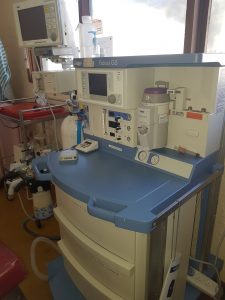
Our anaesthetic machine has a lot of monitoring capability allowing the surgical nurse to have a far more accurate picture of how your pet is coping with general anaesthesia – it monitors heart rate and rhythm (using an ECG – Electrocariograph), respiration rate and depth, oxygen content of the blood also expired carbon dioxide when they breathe out, breathing and heart rates and rhythms, and the circulatory system. Patients are actively warmed during surgery to combat the typical lowering of body temperature, and are watched closely in recovery to ensure they are doing well. They have another full check after surgery, and fluids are continued into the recovery phase also.
A combination of all the procedures discussed above means we can deliver the safest, smoothest anaesthesia and recovery, reduce pain and stress experienced dramatically, and care for your pets as though they were our own. It may increase the costs of our anaesthetics slightly, but the benefits are clear to us each time we perform a general anaesthetic and a patient goes home bright and comfortable. We cannot remove all risks, and extremely rarely complications and reactions to anaesthetics can still occur, however we do all we can to ensure their procedure runs as smoothly as possible.
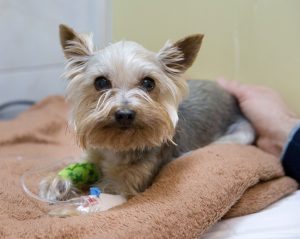
Hospitalisation and Intensive Care
Unwell animals may be required to stay in hospital for their treatment, sometimes for a number of days. Hospital treatment often involves the use of intravenous fluids. These fluids are administered by a pump, which are the same as those used in human hospitals. Many medications required are often in injectable form also, especially if animals are nauseous and vomiting. Close monitoring allows the Veterinarian to detect any early changes in your pet and institute appropriate treatment if required.
Dandenong Veterinary Hospital closes at 8pm weeknights, and 5pm weekends. Animals staying overnight will receive an additional evening check before staff members leave but there are no staff staying on to examine your pet throughout the night. If animals are very unwell and overnight monitoring is recommended then we will suggest that you transfer them to an emergency centre for overnight care. They can then be moved back here the following morning for ongoing treatment. Emergency centres are fully staffed throughout the night and perform thorough monitoring at regular intervals
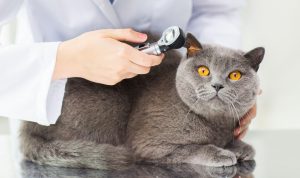
Medical Care
Many illnesses and diseases we treat in animals are medically based (as opposed to Surgical). Often a small change noticed by attentive owners (such as increased thirst or changes in appetite and weight) will alert us to suspect underlying disease. It is very important not to dismiss changes in your pet, even if they may seem small, as some diseases if detected early can be more successfully treated to improve prognosis and outlook.
Many medical conditions are detected by the veterinarian as part of the pet’s wellness twice-for-life consultations or when running routine blood screening, which is why we advocate strongly for these valuable check-ups.
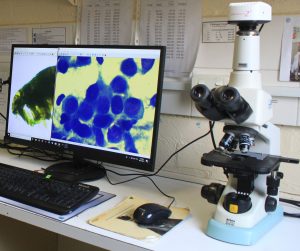
Diagnostic Services
Dandenong Veterinary Hospital offers a large amount of in-house and external Diagnostic Services. In-house services conveniently allow us to perform many services either on the spot, or within the following days for larger procedures, without the need to refer to other institutions. Most Urine and Faecal Tests are completed in our in-house lab, allowing us to get results very quickly and institute treatment sooner. We are often taking samples during consultation for on-the-spot Cytology (examination of the cells under the microscope), such as for ear infections or needle aspirates of lumps.
Blood testing is performed in an external laboratory, allowing us to offer a full range of tests. Turn-around times depend on the test being performed but often results are returned to us by the next day.
We have a modern digital Xray machine, allowing us to perform Radiology quickly and efficiently. We also have the equipment on hand for Electrocardiology (plotting and measuring the electrical pattern of the heart), Blood Pressure Assessment and Endoscopy (used to scope the stomach or colon for visualisation of lesions, to take biopsies, or removal of foreign objects which have been ingested). Ultrasonography is a procedure we refer to a specialist, as they have the equipment and expertise needed to complete an ultrasound study properly. The ultrasound specialist visits our hospital to perform the procedure here in a familiar and convenient environment.
For cases requiring specialist knowledge, surgical procedures or equipment we will organise Specialist Referrals as needed. With many specialists available in the Melbourne area, we will guide you to those we feel are most suitable.
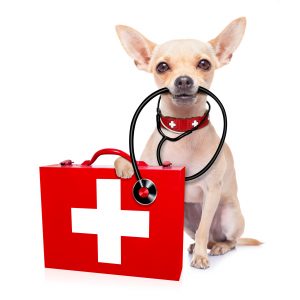
In-house Dispensary and Medication Dispensing
We have a large Dispensary for convenient on-the-spot Medication Dispensing. Veterinarians are bound by similar laws for prescribing medications as human doctors. We are only able to dispense restricted medications (such as antibiotics and other prescription products) for clients of the clinic, with animals we have under our care and have decided have a therapeutic need for the medications we are prescribing. All medications dispensed will have clear instructions for use and storage, and appropriate follow-up will be discussed. Restricted medications are not available for over-the-counter sale and appointments need to be made for a consultation and examination of your pet by the Veterinarian.
In the event that an unusual or uncommon medication is required for your pet, then we commonly can have the item ordered in for you the following day. Some medications may require the purchase of a written prescription that you can present to your local chemist.
Veterinary drugs will carry a label for Animal Use Only and require safe storage as do your own personal prescription medications. It is important that any medications are securely stored away from the reach of children and pets.
In the event of potential intoxication with veterinary medication, please contact us immediately to speak directly with a veterinarian. You can also contact the Victorian Poisons Information Centre for further information.
Many patients require ongoing medications for their condition. Please phone ahead to order medications as it will take a little time for a Veterinarian to make up the medications if they are busy with consultation or surgery. Some medications may need to be ordered, so allowing 1-2 days will give us time to order them in for you if required.
By law, we need to see pets on a regular basis in order to continue to dispense medications – generally a consultation and check over is required every 6 months to ensure your pet is healthy, and many pets are recommended to have blood testing performed on a regular basis also. Your Veterinarian will advise you of what is recommended.